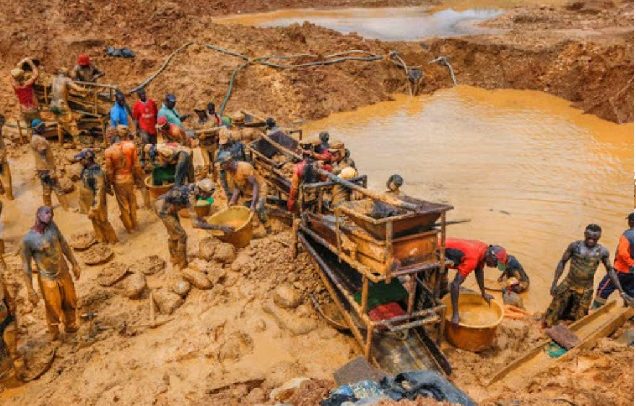The Project Management Institute (PMI) , Ghana has called for collective action and responsible project management in Ghana’s small scale mining sector to avert a looming environmental and health catastrophe.
In a release issued recently, PMI noted “Let us all commit to sustainable practices to protect our environment, health, and future generations.”
According to PMI, it was alarmed at the devastating effects of illegal mining on the nation indicating “We cannot, as a nation, deliberately destroy our very own existence under the guise of keeping a select few in business. We are therefore urging all citizens and stakeholders in the illegal mining value stream to unite in calling for the promotion of sustainable and responsible mining practices. This call to action is critical to safeguarding our environment, health, and future generations.”
It said the urgency of Sustainable Practices Sustainability, according to the United Nations World Commission on Environment and Development, was defined as “development that meets the needs of the present without compromising the ability of future generations to meet their own needs.”
With particular reference to the United Nations Sustainable Development Goals (UN SDGs) goals 13 (Climate action) 14 (Life below water) and 15 (Life on land), it noted that the nation, which was a proud member of the United Nations, has not done much in taking steps towards the achievement of these UN SDGs.
Illegal mining, particularly gold extraction, has been a significant economic activity in Ghana. However, the use of deadly chemicals like mercury and cyanide in mining operations and the disposal of the waste into water bodies has led to severe environmental degradation and health hazards.
PMI continued that mercury and cyanide contamination in water bodies posed a dire threat to humans who relied on these sources for drinking, cooking and farming, among other things. Humans further consume the crops and wildlife, may have substantial deposits of these heavy metals.
On environmental and health impacts, it mentioned some of these as polluted water bodies where mercury and other toxic chemicals have contaminated rivers and streams, making the water unsafe for consumption and agricultural use, whereas wild animals in Ghana’s forests rely on the same contaminated water for hydration.
Commenting further on depleted forest reserves, it said illegal mining activities have led to the destruction of vast forest areas, affecting biodiversity and contributing to climate change adding that the ingestion of heavy metals through contaminated water and the consumption of fish could lead to severe health issues, including neurological and developmental disorders.
Responsible Project Management Practices
PMI also said stopping illegal mining and its environmental impacts required a multi-faceted approach that included stringent regulations, advanced monitoring, community engagement, rehabilitation programs, stakeholder collaboration, economic alternatives, legal actions, environmental impact assessments, and public education.
To address such challenges, PMI Ghana has advocated the strengthening of regulations through implementing and enforcing stringent environmental laws and regulations to control mining activities. This includes setting clear guidelines for legal mining operations and severe penalties for illegal mining.
It also called.for monitoring and surveillance by utilising advanced technologies such as satellite imagery, drones, and remote sensing to monitor mining activities and detect illegal operations promptly.
On community engagement, PMI Ghana said local communities could be educated and involved in the fight against illegal mining through awareness campaigns about the environmental and health impacts of illegal mining and encouraging community reporting of illegal activities. “Communities, when entrusted with ownership of the lands and water bodies will offer better stewardship,” it said pointing out that developing and enforcing mine rehabilitation programmes that required mining companies to restore mined areas to their natural state or to a condition that was safe and usable for other purposes.
Furthermore, it suggested working with various stakeholders, including environmental NGOs, local communities, and international organisations, to create a unified front against illegal mining.
Additionally, it called for the provision of alternative livelihood opportunities for those involved in illegal mining, while also it mentioned that taking legal actions against individuals and organisations involved in illegal mining and imposing heavy fines and penalties would deter such activities.
Environmental Impact Assessments (EIAs)
On these, PMI Ghana suggested mandating comprehensive EIAs before approving any mining projects to ensure that potential environmental impacts were identified and mitigated, and also running public awareness campaigns to educate the general public about the dangers of illegal mining and the importance of environmental protection.
The Project Management Institute, Ghana is calling for the immediate halting of illegal mining through strengthening enforcement of mining regulations and increasing penalties for illegal activities;
consultative stakeholder engagement involving all stakeholders, including local communities, government agencies, and industry players, in decision-making processes; land reclamation where all mined lands would be restored to their natural state through reforestation and soil rehabilitation,” it emphasised.
Dredging and Desilting of Damaged Water Bodies
It said removing sediments and pollutants from contaminated water bodies to restore water quality, implementing water treatment solutions to remove toxic chemicals and make water safe for consumption planting trees and restoring forest ecosystems to combat deforestation and climate change, and enforcing strict legal actions against individuals and entities involved in illegal mining activities to serve as a deterrent to others.
Role of Government and Responsible Citizenship
It advised that “Government, as a steward, must play a pivotal role in enforcing regulations, providing resources for environmental restoration, and supporting sustainable mining initiatives. Citizens, on the other hand, must act responsibly by reporting illegal activities, participating in community engagements, and adopting sustainable practices in their daily lives.”
Source: PMI Ghana

